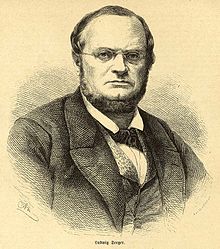Ludwig Seeger (politician)
Ludwig Wilhelm Friedrich Seeger (born October 30, 1810 in Wildbad , † March 22, 1864 in Stuttgart ) was a German politician and poet. Seeger is known as the Swabian Heine because of his political activities and his literary talent .
Life
Ludwig Seeger was born as the son of the secondary school teacher Ludwig Seeger (1776–1843) in Wildbad in Württemberg . He learned his schooling in the Latin school in Calw , and from 1824 in the Evangelical-theological seminar in Schönberg. In 1828 he enrolled at the University of Tübingen as a student of theology and also visited with great interest philological and literary events, including the Stilistikum at Ludwig Uhland . After completing his studies, Seeger worked as a theologian for a short time from 1831, then accepted a position as court master in Switzerland and in 1835 became professor of ancient languages at the secondary school in Bern and at the same time lecturer at the University of Bern .
When the German Revolution of 1848 broke out , he returned to Württemberg and became involved in politics as a liberal. In 1850 he became a member of the Oberamt Ulm for the second constitutional assembly of Württemberg. For the state parliaments from 1851 to 1853 and from 1854 to 1855 he was a member of the Oberamt Waldsee , for the Oberamt Ulm in the state parliament from 1862. He was a member of the Württemberg Progress Party and shop steward of the Frankfurt Thirty-Six Committee and the Committee for Schleswig-Holstein. He died in Stuttgart in 1864.
Writing activity
Ludwig Seeger has made a name for himself as a publicist, poet and translator equally and beyond national borders. In 1850 he was editor of the Ulmer Schnellpost . From 1862 to 1864 he published the democratic magazine Eulenspiegel , to which he also added the supplement Stuttgarter Literäre Wochenblatt .
He published his satirical, politically motivated poems in two collections: Der Sohn der Zeit (1843 and 1847), Politisch-Sociale Gedichte (with August Becker , 1844) and Collected Poems in two volumes (1863, 1864). He was also the editor of the German book of poets from Swabia (1864).
translator
His pointed style also made him a sensitive translator. While he initially published Beranger’s Lieder (1839, 1842) under the pseudonym , his success gave him the courage to publish his other translations under his real name. Published in 3 volumes by the Literary Institute in Frankfurt a. M. the pieces by Aristophanes , which have been reissued several times until today; Already in 1913 there was a new edition by Thassilo von Scheffer , from which two of his transfers were taken over into the traditional island library (1978 "The Clouds" as IB 623 and 2014 "Lysistrate" as IB 1401). Victor Hugo's poetic works followed in 1861 and 1862 . He also took part in the Shakespeare translation supervised by Franz von Dingelstedt , for which he translated three dramas until his death: King John , Hamlet , Timon of Athens . The series only appeared in ten volumes from 1865 after his death.
literature
- Hermann Fischer : Seeger, Ludwig . In: Allgemeine Deutsche Biographie (ADB). Volume 33, Duncker & Humblot, Leipzig 1891, p. 573.
- Rüdiger Krüger : "Elastic only elastic" - Ludwig Seeger in the Wildbad . Bad Wildbad 1994.
- Rüdiger Krüger : Ludwig Seeger. Poet - publicist - politician. ; in: Der Landkreis Calw - Ein Jahrbuch, Vol. 11, Calw 1993, pp. 38–56.
- Frank Raberg : Biographical handbook of the Württemberg state parliament members 1815-1933 . On behalf of the Commission for Historical Regional Studies in Baden-Württemberg. Kohlhammer, Stuttgart 2001, ISBN 3-17-016604-2 , p. 860 .
Web links
- Literature by and about Ludwig Seeger in the catalog of the German National Library
| personal data | |
|---|---|
| SURNAME | Seeger, Ludwig |
| ALTERNATIVE NAMES | Seeger, Ludwig Wilhelm Friedrich |
| BRIEF DESCRIPTION | German politician and poet |
| DATE OF BIRTH | October 30, 1810 |
| PLACE OF BIRTH | Bad Wildbad |
| DATE OF DEATH | March 22, 1864 |
| Place of death | Stuttgart |

